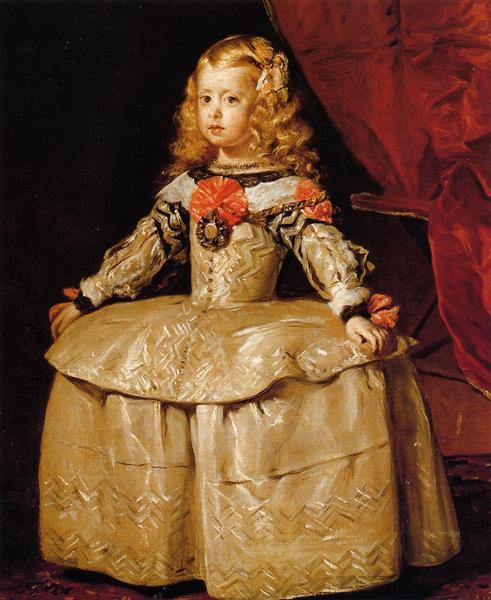Tanım
1656'da Diego Velázquez tarafından boyanan "Beş Yıllık Infanta Margarita'nın portresi" çalışması, sadece sanatçının teknik ustalığını tezahür ettirmekle kalmayıp aynı zamanda yüzyılın İspanyol mahkemesinin dünyasına doğru tek bir pencere sunan temel bir parça. Yüzyılın Altın, Kral Felipe IV ve Mariana'nın kızı, sadece psikolojik incelikleri için değil, aynı zamanda olağanüstü stilistik yetenekleri için de göze çarpan bir merkezidir.
Portrede, genç bebek çeşitli dokularda ve aydınlatmalarda ortaya çıkan beyaz bir elbise ile temsil edilir. Zengin ve büyüleyici kumaş, dikkatini dağıtmayan, ancak ana karakterin figürünü vurgulayan bir surround atmosferi ayırt edebileceğiniz en karanlık arka planla karşılaştırılır. Işık ve gölge kullanımı ustaca; Infanta'nın yüzüne hafif bir şekilde uygulanması gençliğini ve masumiyetini vurgularken, onu çevreleyen gölgeler mahkemedeki rolünün ağırlığını öneren bir derinlik önermektedir.
Güzel naiflikle yakalanan Infanta'nın görünümü, izleyiciyi büyülemeyi başarır, çocuk merakı ve ince bir heybet havası karışımı sunar. Velázquez ona doğrudan ve açık bir görünüm verir ve gözlemciyle duygusal bağlantıyı güçlendirir. Ayrıca, resimsel düzlemdeki konumu da önemlidir; Infanta uzayda göze çarpıyor, sanki tabloyu terk etmek üzereymiş gibi, beraberinde bir dolaysızlık hissi getiriyor.
Bu resmin ilginç bir yönü, diğer bireysel yüzler işte açıkça tanımlanmamış olsa da, ona eşlik eden küçük karakterlerin varlığıdır. Arkasındaki bir karakterin siluetini ayırt edebilirsiniz, bu da bakıcıların veya soyluların mahkemedeki dikkatini önerir. Bu temsil, Margarita'nın yaşadığı samimi ve aynı zamanda düzenlenmiş ortamı öneren bir bağlam katmanı ekler, pozisyonunu sadece merkezi bir figür olarak değil, gerçek soyun ve bunun gerektirdiği beklentilerin sembolü olarak vurgular.
Velázquez'in renk tedavisi de söze değer. Genel palet daha fazla kapanmaya yönelik olsa da, Margarita elbisesinin parlayan beyazları ve banttaki koyu mavi ve kırmızı dokunuşları gibi daha canlı renklerin kullanımı sadece görsel bir denge oluşturur, aynı zamanda aynı zamanda Zaman, temsil edilen şeklin önemini ve benzersizliğini güçlendirir. Bu renkli kontrastlar gözlemciyi yakalar ve çalışmaya ince bir dinamizm verir.
Barok bağlamında, "Beş yıllık Margarita Infanta'nın portresi", doğal yaklaşımındaki hareketin özelliklerini ve insan psikolojisine derin ilgisini vurgular. Velázquez sadece modelinin fiziksel görünümünü yakalamakla kalmaz, aynı zamanda onu diğer çağdaş portrelerden ayıran ayırt edici bir özellik olan iç özünü de iletir.
Bu portre, Velázquez'in kraliyet ailesi için yaptığı ve birçoğunun öznelerinin onurlu ve saygılı temsiline benzer bir yaklaşımı paylaştığı bir dizi eserin bir parçasıdır. Mahkemedeki sanat ve yaşam arasındaki etkileşim ve insan figürünün temsilindeki ustalık, bu çalışmada İspanyol sanatı tarihinin en önemlilerinden biri olarak konsolide edilmektedir.
"Beş Yıllık Infanta Margarita'nın Portresi", Diego Velázquez'in eşsiz yeteneğinin bir ifadesi ve sanatın sadece görünüşü değil, aynı zamanda insanın kültürel ve duygusal bağlamında karmaşıklığını nasıl yakalayabileceğine dair muhteşem bir örnektir. Resim, sadece estetik güzelliği için değil, yüzyıllar boyunca yankılanan zengin bir anlatıyı uyandırabilme yeteneği için bir hayranlık ve çalışma nesnesi olmaya devam ediyor.
KUADROS ©, duvarınızda ünlü bir boya.
Profesyonel sanatçıların kalitesi ve ayırt edici mührü ile el yapımı yağlı boya boya tablolar KUADROS ©.
Memnuniyet garantisi ile resim reprodüksiyon hizmeti. Resminizin kopyasından tamamen memnun değilseniz, paranızı%100 iade ederiz.

